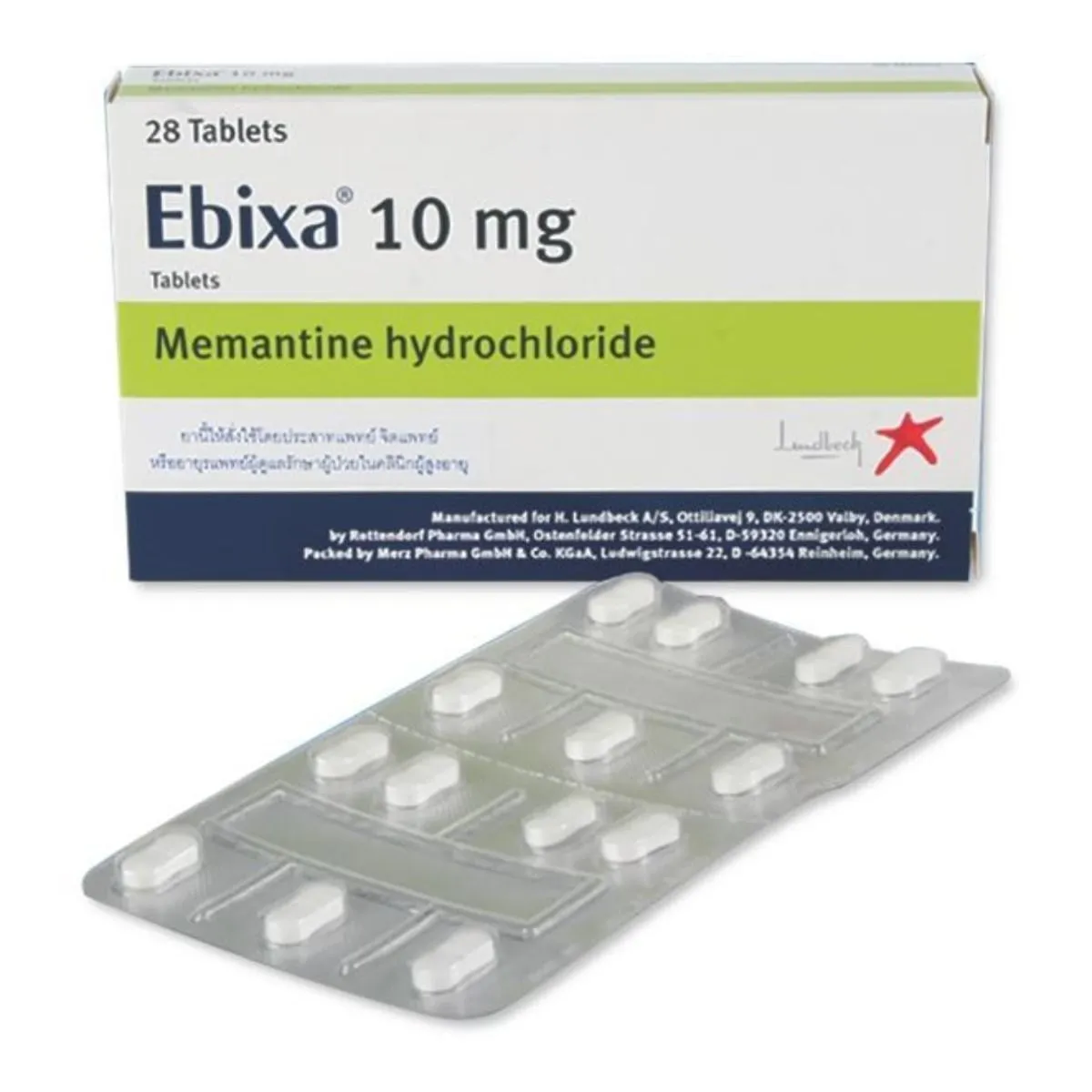Comprehensive Guide to Memantine: Uses, Dosage, Side Effects, and More
What is Memantine?
Overview of Memantine
Generic Name: Memantine
Brand Name: Namenda, Ebixa, generics
Drug Group: NMDA receptor antagonist (anti-dementia agent)
Commonly Used For
- Treat moderate to severe Alzheimer’s disease.
- Manage vascular dementia symptoms.
- Support cognitive decline in Parkinson’s disease.
Key Characteristics
Form: Oral tablets (5 mg, 10 mg, 15 mg, 20 mg), oral solution (2 mg/mL), or extended-release capsules (7 mg, 14 mg, 21 mg, 28 mg) (detailed in Dosage section).
Mechanism: Blocks excessive NMDA receptor activity, reducing excitotoxicity in neurons.
Approval: FDA-approved (2003 for Namenda) and EMA-approved for Alzheimer’s disease.

Indications and Uses of Memantine
Memantine is indicated for a variety of cognitive and neurodegenerative conditions, leveraging its neuroprotective properties:
Moderate to Severe Alzheimer’s Disease: Improves memory, attention, and daily functioning, per neurology guidelines, supported by clinical trials showing a 2–3 point improvement on the ADAS-cog scale over 6 months.
Vascular Dementia: Manages cognitive impairment due to cerebrovascular disease, reducing progression, recommended in geriatric medicine protocols with evidence of stabilized MMSE scores.
Parkinson’s Disease Dementia: Treats cognitive decline in Parkinson’s patients, enhancing quality of life, with movement disorder studies.
Mild Cognitive Impairment (MCI): Investigated off-label to delay progression to dementia, with neuropsychology research.
Huntington’s Disease: Explored off-label to reduce chorea and cognitive symptoms, with neurology data.
Traumatic Brain Injury (TBI): Used off-label to mitigate post-injury cognitive deficits, with rehabilitation medicine evidence.
Multiple Sclerosis (MS) Cognitive Decline: Initiated off-label to address memory issues, with MS neurology studies.
Autism Spectrum Disorder (ASD): Studied off-label for social and cognitive improvements in children, with pediatric psychiatry research.
Chronic Pain with Neuropathic Component: Investigated off-label to modulate glutamate-related pain, with pain management data.
Glaucoma-Related Neuroprotection: Explored off-label to protect retinal ganglion cells, with ophthalmology-neurology evidence.
Dosage of Memantine
Dosage for Adults
Moderate to Severe Alzheimer’s Disease:
- Immediate-Release: Start at 5 mg once daily, titrate weekly by 5 mg to a target of 10 mg twice daily (20 mg total).
- Extended-Release: Start at 7 mg once daily, increase weekly by 7 mg to a target of 28 mg once daily.
Vascular Dementia (Off-Label):
- 10–20 mg daily, adjusted based on cognitive response and tolerability.
Parkinson’s Disease Dementia (Off-Label):
- 5–15 mg daily, titrated slowly to minimize side effects.
Dosage for Children (Off-Label, ≥6 years)
Autism Spectrum Disorder or TBI:
- 0.1–0.3 mg/kg/day, divided into 1–2 doses, under pediatric neurology supervision, with dose escalation over 4 weeks.
Dosage for Pregnant Women
Pregnancy Category B: Use only if benefits outweigh risks; consult an obstetrician and neurologist, with fetal monitoring.
Dosage Adjustments
Renal Impairment:
- Mild (CrCl 50–80 mL/min): No adjustment; monitor closely.
- Moderate (CrCl 30–49 mL/min): Maximum 10 mg daily (immediate-release) or 14 mg daily (extended-release).
- Severe (CrCl 5–29 mL/min): Maximum 5 mg daily; avoid in end-stage renal disease (CrCl <5 mL/min).
Hepatic Impairment:
- Mild to moderate (Child-Pugh A or B): No adjustment; severe (Child-Pugh C): Use cautiously with monitoring.
Concomitant Medications: Adjust if combined with amantadine or ketamine (other NMDA antagonists), increasing side effect risk; monitor.
Elderly: Start with 5 mg daily; titrate slowly due to age-related renal decline.
Additional Considerations
- Take this active ingredient with or without food, preferably at the same time daily.
- Use a calibrated device for oral solution dosing; shake well before use.
- Monitor cognitive and behavioral changes weekly during titration.
How to Use Memantine
Administration:
- Oral Tablets/Capsules: Swallow whole with water, do not crush or chew extended-release forms.
- Oral Solution: Use the provided syringe to measure dose, mix with a small amount of water if needed.
Timing: Take once or twice daily as prescribed, maintaining a consistent schedule.
Monitoring: Watch for confusion, hallucinations, or signs of renal issues (e.g., reduced urine output); report changes immediately.
Additional Tips:
- Store at 15–30°C (59–86°F), protecting from moisture and light.
- Keep out of reach of children; discard unused solution after 1 month once opened.
- Encourage caregivers to track cognitive progress with tools like the MMSE or ADAS-cog.
- Avoid abrupt discontinuation to prevent withdrawal symptoms; taper over 1–2 weeks if stopping.
- Schedule regular follow-ups with a neurologist every 3 months to assess efficacy and adjust dose.
Contraindications for Memantine
Hypersensitivity: Patients with a known allergy to Memantine or its components.
Severe Renal Impairment: Contraindicated in CrCl <5 mL/min due to accumulation risk.
Severe Hepatic Impairment: Avoid in Child-Pugh Class C due to limited metabolism data.
Concurrent Use with Other NMDA Antagonists: Avoid with amantadine, ketamine, or dextromethorphan due to additive effects.
Uncontrolled Seizure Disorders: Contraindicated due to potential seizure threshold lowering.
Acute Psychotic Episodes: Avoid in active psychosis to prevent exacerbation.
Side Effects of Memantine
Common Side Effects
- Dizziness (5–10%, managed with rest)
- Headache (4–8%, relieved with hydration)
- Confusion (3–7%, monitored by caregivers)
- Constipation (2–6%, managed with fiber)
- Fatigue (2–5%, decreases with time)
These effects may subside with adaptation or dose adjustment.
Serious Side Effects
Seek immediate medical attention for:
- Psychiatric: Hallucinations, psychosis, or suicidal thoughts.
- Neurological: Seizures or severe agitation.
- Cardiovascular: Hypertension or bradycardia.
- Renal: Acute kidney injury (rare).
- Allergic: Rash, angioedema, or anaphylaxis.
Additional Notes
Regular monitoring with cognitive assessments (e.g., MMSE) every 3 months is essential to evaluate efficacy and side effects.
Patients with a history of psychiatric illness should be closely watched for mood changes.
Renal function tests (e.g., CrCl) should be checked every 6 months during long-term use.
Report any unusual symptoms (e.g., vision changes, severe lethargy) immediately to a neurologist.
Long-term use (>1 year) requires periodic liver function tests to detect rare hepatotoxicity.
Warnings & Precautions for Memantine
General Warnings
Hallucinations/Psychosis: Risk of confusion or delusions, especially in advanced dementia; monitor behavior.
Seizure Risk: Increased in patients with a history of seizures; use with caution.
Renal Function Decline: Risk of accumulation; check CrCl before and during therapy.
Cardiovascular Effects: Rare hypertension or tachycardia; monitor in at-risk patients.
Dizziness: Risk of falls in elderly; advise caution.
Additional Warnings
Withdrawal Symptoms: Risk with abrupt cessation; taper gradually.
Hepatic Enzyme Elevation: Rare liver function changes; monitor in chronic use.
Suicidal Ideation: Rare risk in depressed patients; assess mental health.
Cognitive Worsening: Potential paradoxical decline; evaluate efficacy regularly.
Hypersensitivity Reactions: Rare rash or anaphylaxis; discontinue if severe.
Use in Specific Populations
- Pregnancy: Category B; use with caution, monitoring fetal neurodevelopment.
- Breastfeeding: Use caution; monitor infant for sedation.
- Elderly: Higher risk of side effects; start with lowest dose.
- Children: Safe off-label with neurology oversight.
- Renal/Hepatic Impairment: Adjusted or avoided based on severity.
Additional Precautions
- Inform your doctor about kidney disease, seizures, or psychiatric history before starting this medication.
- Avoid alcohol to reduce sedation and cognitive impairment risk.
- Use fall prevention strategies (e.g., grab bars) for at-risk patients.
Overdose and Management of Memantine
Overdose Symptoms
- Mild agitation, confusion, or drowsiness.
- Severe cases: Hallucinations, coma, or respiratory depression.
- Tremors, ataxia, or vomiting as early signs.
- Seizures or cardiovascular collapse with extremely high doses.
Immediate Actions
Contact the Medical Team: Seek immediate medical help if overdose is suspected.
Supportive Care: Monitor vital signs, provide oxygen, and manage seizures with benzodiazepines if needed.
Specific Treatment: No specific antidote; use activated charcoal if ingestion is recent (within 1–2 hours).
Monitor: Check renal function, EEG, and mental status for 24–48 hours.
Patient Education: Advise against doubling doses and to store safely.
Additional Notes
- Overdose risk is linked to renal impairment; store securely and verify doses.
- Report persistent symptoms (e.g., severe confusion, irregular breathing) promptly.
Drug Interactions with Memantine
This active ingredient may interact with:
- Other NMDA Antagonists: Increases side effects (e.g., amantadine, ketamine); avoid combination.
- Urinary Alkalinizers: Raises levels (e.g., sodium bicarbonate); monitor.
- Anticholinergics: Potentiates confusion (e.g., oxybutynin); use cautiously.
- CYP2B6 Inhibitors: May alter metabolism (e.g., fluoxetine); monitor.
- Levodopa: May enhance motor effects in Parkinson’s; adjust dose.
Action: Provide your healthcare provider with a complete list of medications.
Patient Education or Lifestyle
Medication Adherence: Use this NMDA antagonist as prescribed for dementia, following the daily schedule.
Monitoring: Report confusion, hallucinations, or signs of kidney issues immediately.
Lifestyle: Engage in cognitive exercises; avoid alcohol.
Diet: No specific restrictions; ensure adequate hydration.
Emergency Awareness: Know signs of overdose or psychiatric changes; seek care if present.
Follow-Up: Schedule regular check-ups every 3 months with a neurologist to assess cognition and renal function.
Pharmacokinetics of Memantine
- Absorption: Oral, peak at 3–7 hours; bioavailability ~100%.
- Distribution: Volume of distribution ~9–11 L/kg; 45% protein-bound.
- Metabolism: Minimal hepatic via CYP2B6 and CYP2D6 to minor metabolites.
- Excretion: Primarily renal (57–82% unchanged); half-life 60–80 hours.
- Half-Life: 60–80 hours, prolonged in renal impairment.
Pharmacodynamics of Memantine
This drug exerts its effects by:
Blocking overactive NMDA receptors, preventing glutamate-induced neurotoxicity.
Enhancing cognitive function in Alzheimer’s by stabilizing neuronal activity.
Exhibiting dose-dependent risks of psychosis and renal accumulation.
Storage of Memantine
Temperature: Store at 15–30°C (59–86°F); protect from moisture and light.
Protection: Keep in original container, away from heat and humidity.
Safety: Store in a secure location out of reach of children and pets due to cognitive risk.
Disposal: Dispose of unused tablets or solution per local regulations or consult a pharmacist.
Frequently Asked Questions (FAQs)
Q: What does Memantine treat?
A: This medication treats Alzheimer’s disease.
Q: Can this active ingredient cause dizziness?
A: Yes, dizziness is common; use caution.
Q: Is Memantine safe for children?
A: Yes, off-label with supervision.
Q: How is this drug taken?
A: Orally as tablets or solution, as directed.
Q: How long is Memantine treatment?
A: Often long-term, with regular review.
Q: Can I use Memantine if pregnant?
A: Yes, with caution; consult a doctor.
Regulatory Information
This medication is approved by:
U.S. Food and Drug Administration (FDA): Approved in 2003 (Namenda) for Alzheimer’s disease.
European Medicines Agency (EMA): Approved for moderate to severe Alzheimer’s.
Other Agencies: Approved globally for dementia; consult local guidelines.
References
- U.S. Food and Drug Administration (FDA). (2023). Namenda (Memantine) Prescribing Information.
- Official FDA documentation detailing the drug’s approved uses, dosage, and safety.
- European Medicines Agency (EMA). (2023). Memantine Summary of Product Characteristics.
- EMA’s comprehensive information on the medication’s indications and precautions in Europe.
- National Institutes of Health (NIH). (2023). Memantine: MedlinePlus Drug Information.
- NIH resource providing detailed information on the drug’s uses, side effects, and precautions.
- World Health Organization (WHO). (2023). WHO Model List of Essential Medicines: Memantine.
- WHO’s consideration of Memantine for dementia.
- Alzheimer’s & Dementia. (2022). Memantine in Alzheimer’s Disease.
- Peer-reviewed article on Memantine efficacy (note: access may require a subscription).
